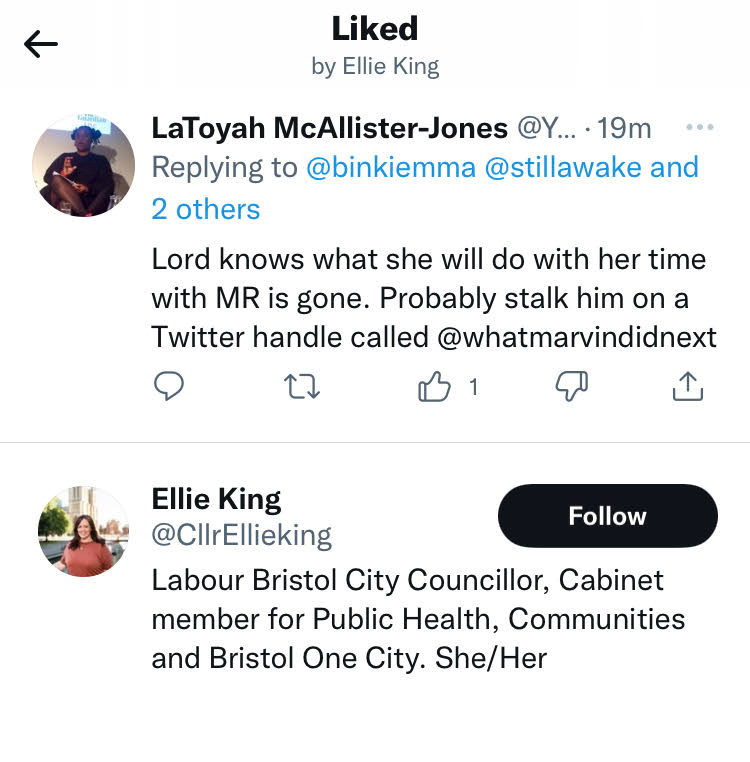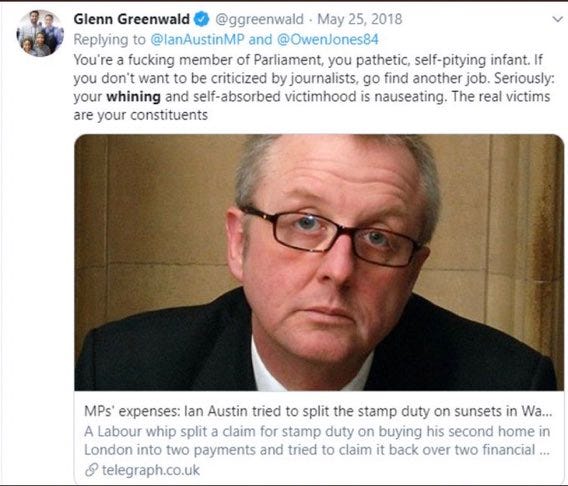If you fight for freedom, you can't rest, and you will be attacked
When we write about other people, there are consequences. These consequences can be detrimental to people’s livelihoods. If you are receiving benefits, for example, or your children are receiving support from the same place you write about in your journalism, then you might be tempted to just not cover some things. If you are dependent on your council to fund your child’s special needs, for example, then you might feel your best choice is to grin and bear it.
In a lighter note, I know one journalist who as soon as they became a food reviewer, stopped socialising with chefs, restaurant owners, and their staff. You can’t write about people and question what they are doing without expecting some kind of feedback, blowback, or consequence. It can also affect relationships.
But if we want to talk about what our councils or government are doing, one would think it’s useful that we have politicians and cabinet members. We pay them so they can be there to take the flack for their staff and support the policy decisions they have decided on. Some politicians do it very well and can handle criticism and deal with complaints without getting triggered emotionally. Others cannot.
I have received plenty of attacks over the years. Some male friends of mine are often astonished at how I get attacked more than they do even with similar attitudes.
These attacks are useful because they are invariably along the same lines.
Being called a racist
When you are criticising or questioning people who are visible minorities and who already receive racist abuse as part of their lives (because we live in a structurally racist world), you will more likely than not be called a racist for any type of unwanted scrutiny.
This will be used as a deflection technique even where the questioning is legitimate and of public interest.
For example, on 14 July 16.05, the deputy mayor of Bristol wrote in reply to a tweet from a man name Angus Gregson about me:
"The woman has an unhealthy obsession with Marvin and she has attempted to FOI on numerous occasions. One request she demanded every email from May 2016 to 2021 on our race leadership programme. She does not give a toss about race & is a despicable "Karen". Yes I said it!"
“She does not give a toss about race” is clearly an implication that I am racist. A ‘despicable Karen’ is also a slur.
Then the following day, once I’d responded to this tweet asking about the FOI, and then realising it was about a program called Stepping Up, the deputy mayor replied as follows:
"Why are you chatting (poo emoji) who gets paid £22k a month and also your (sic) just pissed because your frivolous & vexations FOI came up empty as have all your fishing expeditions. Go do some real work & stop wasting taxpayer £."
In these two tweets alone, the deputy mayor was deeply offensive, called me a racist while also using a racial slur against me, and called me a conspiracy theorist and used another technique for deflection, calling out my use of democracy to scrutinise what the council is doing.
I replied as follows in relation to the payments.




I was also prompted to keep pursuing that FOI that I’d forgotten about and I received a reply that day. [that’s a story for another day]
The deputy mayor is not the only one to accuse me of being racist because I asked about public money and public decision making.
Conspiracy Theorist
The next favourite line is that any scrutiny or FOIs are done by conspiracy theorists. The response is usually followed by something like ‘we need to get on with real work’.
Or they tell you that if your tone was nicer, if you asked better questions, if you engaged nicely, then that would be suitable work for you.
It doesn’t matter what they say.
If you are questioning and scrutinising decisions made by publicly funded politicians, you have a right to do that. Every Freedom of Information request that is made has to follow regulations stated by law. If they are not appropriate then they will not be accepted. I get accused of being ‘obsessed’ and a stalker. The following is from the same thread and was ‘liked’ by a cabinet member in the current administration, Ellie King.
These comments are meant to shame people into not pursuing the scrutiny they intend to.
[I will talk another time about the bad-faith use of vexatious requests by politicians so they don’t have to answer questions about how they do the job we pay them for. The deputy mayor made reference to it in her Tweet.]
Religion
Often, the comments are personal. One police communications officer known on twitter as @gingerdave82 would mention my husband, some mention my faith — Buddhism — which is more of a practice really but comes up as a protected category under religion.
One was the CEO of Trinity Community Arts Centre, Emma Harvey, mentioned above, who is also a trustee at the Bristol Law Centre. The other was the executive director at St Paul’s Carnival CIC. Both are part of the One City Culture Board members.
Wasting money
Wasting money has been mentioned by Cllr Craig above so I’ll explain a bit more. When I discovered that the mayor’s office were paying £3000 a month for years, to a company so they could find out what people were saying about the mayor, I was invited onto BBC’s Radio Bristol. I spoke about the cost, the lists of twitter users that were sent to the mayor monthly, and the reports that were really quite weak by most standards — often getting things wrong.
Note that the cost of the mayor’s personalised Twitter reports came to £110k of public money over the time it was used.
That was the first time the council used the attack line on me that I was wasting money. They had my details and were on the radio program after me, to tell viewers that I was wasting the council’s time and money.
That same accusation was tweeted about yesterday as well by Trinity CEO Harvey. This thread was then Retweeted by the night-time tsar who gets publicly funded to the tune of £50k a year to lobby for the night-time economy. That funding comes from the public health budget and from the Growth and Regeneration budget.
I don’t know the exact cost that was mentioned about the FOIs because I blocked her when she kept calling me racist. I was told it was £45k.
There are a couple of responses to this:
Firstly, the council does not hire data protection officers to ensure that I get responses to my queries. They hire them because they have to. The council is subject to FOI legislation and each request is assessed on its merits.
The same excuse was used in the mayoral referendum too, with figures ranging from £600k to £1m for the decision on how to run our city. Democracy was meant to be too costly for this administration.
Secondly, an FOI request I put in asking for communications between the Bristol Post and the council for just eight days, resulted in 465 pages of emails and replies. That was just for eight days.
The council do not reply when I contact the press office, however, because I have been blacklisted since I wrote about the mayor’s faith adviser in July 2019.
This is another method of trying to stop scrutiny. FOIs have uncovered an incredible amount in Bristol, including active work to cancel a public project — the arena — and get planning for YTL, a private corporation; Spying on Twitter users, and many more.
The attacks don’t stop
Two further organisations have attacked me online: 1) the police communications department through one of their staff who used to work at Bristol City Council comms; 2) the second is Matt Griffiths who is the policy director at Business West.
The latter blocked me and all people I usually communicate with so he could post quite inflammatory and intimidating content about my anti-imperialist writing:


Business West are the Bristol Chamber of Commerce and they get nearly 80% of their £10m turnover from public money.
They are also involved in policy making with the council, as FOIs have uncovered.


Self-Reflection
But there is always time and space for self-reflection. There are two questions I always consider when I research and write: does this action involve public money? and does it involve the powers of the decision-makers in the city?
A yes to either of those means that it is of public interest to me and other residents.
Be prepared for the blowback
When you write about people there will be a reaction. It doesn’t matter if you write film reviews or about concerts or restaurants or other things you find innocuous in your personal life, let alone about millions of pounds. Your slating of someone’s performance could be a huge thing to them. I find myself writing less and less about private enterprises unless the impact on the public is just too big to ignore.
But when it comes to politicians or those involved in policy and decision making and who benefit from public funds, then they get scrutinised.
Glenn Greenwald said it best when he wrote to Ian Austin MP on Twitter in 2018:
"You're a fucking member of Parliament, you pathetic, self-pitying infant. If you don't want to be criticized by journalists, go find another job. Seriously: your whining and self-absorbed victimhood is nauseating. The real victims are your constituents."
I don’t personally use that kind of language but the point is a clear one.
If you don’t want to be criticised by journalists, don’t become a politician.
The onus is not on journalists who serve the public and help them understand how best to choose in life. It is on politicians who are accountable to the public.
As long as my work is in the public interest, I will continue to pursue it.
I have a lot of empathy for those who don’t want to put up with the abuse or the harassment. I understand that. No one goes to work wanting a war. It’s not meant to be a boxing match.
But I’ll say this, the abuse and harm that comes from ignoring council decision making is not trivial. It leads to abuse, a lack of services, and harm to the most vulnerable.
“When you fight for freedom, you can’t rest.” bell hooks








